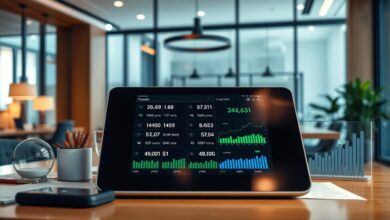Cybersecurity for Digital Account Holders in Nigeria: Protecting Your Finances Online
Digital accounts in Nigeria offer easy online banking but also risks. Cyber threats are growing, making digital account security crucial. Everyone, from individuals to businesses, faces digital fraud risks in Nigeria.
Cyberattacks and data breaches are increasing, hitting bank accounts and trust in banking. The Central Bank of Nigeria (CBN) is working to improve online banking security. It’s important for users to stay alert and protect their information and assets.
In today’s world, weak passwords and lack of awareness can cause big financial losses. It’s essential to know how to protect yourself online. This is not just a choice but a must.
Understanding Digital Account Cybersecurity in Nigeria
Cybersecurity is key for digital account users in Nigeria, with more cyber threats targeting financial data. These threats are big, so we need to understand the online world better. We must know about security, threats, and local laws.
The Importance of Cybersecurity for Users
Cybercrime has caused big financial losses in Nigeria. In 2022, the country lost over ₦5.5 trillion to cybercrime. This hit banking and e-commerce hard. Secure mobile banking is vital to protect against fraud and keep finances safe.
Current Cyber Threat Landscape
The cyber threat situation in Nigeria is very bad. There was a huge jump in cyberattacks on banks during the COVID-19 pandemic. In 2022, over 150,000 phishing attempts targeted banks and finance. This shows we must know the risks and follow cybersecurity rules.
Regulations and Compliance in Nigeria
The Nigerian government is fighting cybercrime with laws and policies. The Cybercrimes (Prohibition, Prevention, etc.) Act of 2015 helps protect the financial sector. Banks and financial institutions must follow these Nigerian cybercrime laws to build trust and secure online transactions.
Common Cyber Threats to Digital Accounts
Digital account holders in Nigeria face many cyber threats. These threats can harm their financial safety. It’s important to know about phishing scams, malware, and social engineering attacks to defend against them.
Phishing Attacks: What to Look For
Phishing attacks are common in Nigeria. They use fake emails or websites to trick people into sharing personal info. Look out for:
- Unexpected emails asking for sensitive information
- Links to unfamiliar websites that look like real services
- Spelling and grammatical errors in messages
To prevent phishing scams, learn to spot suspicious emails and be careful with your personal data.
Malware and Ransomware
Malware and ransomware attacks are big threats in Nigeria, especially in healthcare and finance. These attacks can cause:
- Unauthorized access to systems and data theft
- Disruptions to services
- Financial losses from ransom payments and downtime
To fight these threats, use strong malware detection and keep systems updated and monitored.
Social Engineering Techniques
Social engineering attacks use tricks to get people to reveal info. Attackers might pretend to be someone you trust. They use tactics like:
- Pretexting, where they make up a story to get info
- Baiting, offering something to get personal info
- Quizzes or surveys to trick people into sharing data
Teaching employees to spot these tricks can help protect against them.
Best Practices for Protecting Digital Accounts
For those online in Nigeria, keeping accounts safe is key. It guards against cyber threats and makes online deals secure.
Strong Password Management
Using strong password tips is crucial for digital safety. Make passwords complex with letters, numbers, and symbols. Use a password manager to keep track of them safely.
Two-Factor Authentication Explained
Two-factor authentication adds a strong layer of security in Nigeria. It asks for a second step, like a code on your phone. This helps protect against hackers.
Regular Software Updates
Regular updates are vital to fight off cyber attacks. They fix weaknesses in your system and apps. Keeping your software up-to-date is essential for account safety.
The Role of Financial Institutions
Financial institutions in Nigeria play a key role in keeping customer funds safe. At the Nigeria Fintech Week 2024, finding a balance between innovation and protecting assets was discussed. This shows the need for banks to invest in strong cybersecurity to prevent losses from cyber threats.
Cybersecurity Measures by Banks
Security is now a key part of the product life cycle in fintech. Banks are using advanced tech like artificial intelligence to detect threats. The idea of ‘fail fast – learn faster’ is important for success in the financial world. By doing this, banks aim to protect against financial losses from cyber attacks.
Consumer Protection Programs
Consumer protection programs in Nigeria go hand in hand with cybersecurity efforts. The Central Bank of Nigeria’s Consumer Protection Regulations require banks to quickly answer customer questions. This builds trust and protects user interests. Working with experts helps banks understand and tackle digital risks better.
Collaboration with Regulatory Bodies
Working with the CBN has helped improve cybersecurity in Nigeria’s financial sector. The CBN’s Risk-Based Cybersecurity Framework sets standards for compliance. This teamwork helps fight cyber threats, making the financial environment safer for fintech companies in Nigeria.
Recognizing Signs of a Compromised Account
It’s important to know when your account might be in trouble. Look out for odd transactions and alerts about suspicious activity. These signs can mean your account has been hacked. By acting fast, you can protect your personal info.
Unusual Transactions and Activity Alerts
Keep an eye on your account for anything strange. If your bank sends you alerts, it could mean someone’s trying to get into your account. Look for things like sudden money going out or unexpected purchases. Catching these signs early can help you lock down your account fast.
Login Cooperation and Notifications
Many banks send you messages when someone tries to log in or change your account settings. These messages are key to knowing if someone’s trying to get into your account. Spotting these alerts quickly lets you take steps to keep your account safe.
Steps to Take if an Account is Breached
If your account gets hacked, there are steps you can take. Here’s what to do:
- Change your password right away.
- Call your bank to tell them about the problem.
- Check your bank statements for any odd transactions.
- Turn on two-factor authentication if you can.
By taking these actions, you can limit the damage and get your account back to normal.
Cybersecurity Tools and Solutions
Using the right cybersecurity tools is key to protecting digital accounts. These tools not only strengthen security but also give users in Nigeria peace of mind. A strong cybersecurity plan includes antivirus software and firewalls to fight malware and block unauthorized access.
Advanced data encryption in digital banks keeps sensitive info safe during transactions. Also, getting cybersecurity insurance can act as a safety net against cyber threats.
Antivirus Software and Firewalls
Antivirus software in Nigeria is vital in fighting off malware. Firewalls block unauthorized access to networks. Together, they are the first line of defense, catching threats before they cause harm.
Encryption Technologies
Data encryption in digital banks is crucial. It makes sensitive financial data unreadable to unauthorized users during transmission. Encryption helps digital banks keep customer trust and follow local laws.
Cybersecurity Insurance: Is It Worth It?
In today’s world, cyber threats are common. Many people get cybersecurity insurance to protect their finances against breaches. While it may seem like an extra cost, it can help manage risks and give peace of mind.
Government Initiatives on Cybersecurity
The Nigerian government sees the need for better cybersecurity in our digital world. They have a plan to make security stronger in many areas. This plan helps keep our online transactions safe as technology changes fast.
National Cybersecurity Policy
The national cybersecurity policy is a guide to fight cyber threats. It brings together government and private groups to make our digital space safer. It focuses on laws, handling cyber attacks, and protecting important digital info.
Role of the Nigerian Communications Commission
The Nigerian Communications Commission is leading the way in cybersecurity. They make sure telecom companies follow strict security rules. This helps keep users safe and grows our digital economy.
Public Awareness Campaigns
Teaching people about cybersecurity is key. Campaigns help spread the word on how to stay safe online. They teach us to be careful and proactive in protecting our digital lives.
Training and Education for Digital Users
Training and education are key to boosting cybersecurity awareness in Nigeria. Many online resources in Nigeria help users learn about safe online practices. Workshops and programs teach people how to stay safe online.
Online Resources and Workshops
Many groups offer online learning tools for cybersecurity. Places like Artificial Intelligence Technologies (AITECH) in Abuja and Covenant University have courses for all levels. Getting certifications like CEH and CISSP can boost your career.
Fibertrain is known for its wide range of training, including private sessions and workshops. These focus on practical, real-world skills.
Importance of Cyber Hygiene
Knowing how to stay safe online is crucial. Always update your passwords and be careful with email links. Using two-factor authentication is also important.
Learning these habits can help avoid cyber threats like phishing and ransomware. It’s a big step in protecting yourself online.
Engaging Local Communities
Getting communities involved in cybersecurity is very effective. Local workshops and seminars teach about new threats and safe online habits. They help people work together to stay safe online.
The Future of Digital Account Security in Nigeria
The digital account security in Nigeria is changing fast. New technologies and trends bring both chances and challenges. Blockchain and artificial intelligence are being used to fight cyber threats. With Africa facing 60% of global cyber-attacks, it’s urgent to use these new tools.
Emerging Technologies and Trends
The digital economy is growing fast, reaching $18.3 billion by 2026. But, this growth also means more cyber threats. Nigeria saw a 186% rise in electronic fraud last year, with fintech hit the hardest.
Strong cybersecurity is key. This includes better identity checks and secure APIs. It’s vital for a strong digital economy.
Predictions for Cyber Threats
Experts warn of more ransomware and data breaches. The 2023 Africa Financial Industry Barometer shows 97% of top financial leaders see cybercrime as a big threat. To tackle this, we need teamwork from banks, regulators, and tech companies.
Building a Resilient Digital Economy
Building a strong digital economy in Nigeria needs ongoing education and awareness. Liquid Intelligent Technologies is leading with cybersecurity solutions. They focus on following rules and responding to incidents.
Programs like the CyberGirls Fellowship are also important. Led by Confidence Staveley, they teach the next generation about cybersecurity. With these efforts, Nigeria can build a safer digital future.
FAQ
What cybersecurity measures should digital account holders in Nigeria adopt?
How can phishing scams be avoided while banking online?
What role do Nigerian banks play in ensuring cybersecurity?
What should a user do if they suspect their account has been compromised?
How does the government support cybersecurity in Nigeria?
What is the significance of using two-factor authentication in Nigeria’s digital banking?
Are there specific laws in Nigeria targeting cybercrime?
What resources are available for educating users about cybersecurity?
How can encryption technologies protect online transactions?
Published on: 29 de December de 2024

Abiade Martin
Abiade Martin, author of WallStreetBusiness.blog, is a mathematics graduate with a specialization in financial markets. Known for his love of pets and his passion for sharing knowledge, Abiade created the site to provide valuable insights into the complexities of the financial world. His approachable style and dedication to helping others make informed financial decisions make his work accessible to all, whether they're new to finance or seasoned investors.






